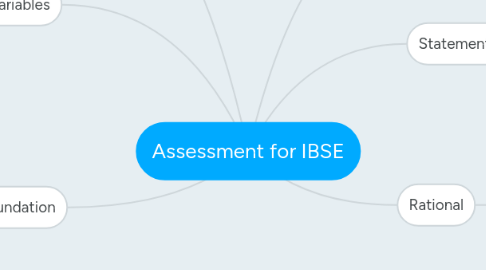
1. Variables
1.1. Independent: Project Based Assessment
1.2. Dependent: Student inquiry skills and knowledge based on response to VASI questionnaire
2. Theoretical Foundation
2.1. Problem
2.1.1. Aligned assessment for IBSE is absent from curriculum
2.2. Objective
2.2.1. Support students comprehension of IBSE through aligned curriculum and assessment
2.3. Research Question
2.3.1. How does project based assessment correlate with student learning of scientific inquiry as measured by the VASI questionnaire among high school science students.
2.3.1.1. VASI
2.3.1.2. Project Based Assessment
2.3.1.3. IBSE
2.3.2. Which assessment model best aligns to NGSS inquiry-based science learning outcomes for high school science students?
2.3.3. Will projects based assessment, paired with inquiry-based science education, prepare students for taking standardised assessments?
3. Controversy
3.1. Teachers are obstinate to change their assessments they have been delivering for years
3.1.1. Multiple choice tests are quick and easy to grade
3.2. As some point in a students career, they will have to take a standardised test
3.2.1. Will project based assessment help prepare students for these tests?
4. Research Question
4.1. How does project based assessment correlate with student learning of scientific inquiry as measured by the VASI questionnaire among high school science students.
4.1.1. Types of assessments and how they have, in the past supported inquiry in the classroom.
4.1.2. Project-based assessment and the successes it has had with student learning
4.1.3. Views on Scientific Inquiry Questionnaire (VASI) is a way to gauge how students are learning about scientific inquiry
5. Statement of Purpose
5.1. The purpose of this study is to examine the relationship between project based assessment and student learning of scientific inquiry. This relationship will be analysed by results of student response to the VASI questionnaire.
6. Rational
6.1. Inquiry-based education (IBSE) has shown in multiple contexts to be a valuable methodology to adopt in the science classroom to further student understanding of science inquiry. Studies support the use of IBSE but often conclude with saying that more is needed in supporting the whole student with assessments that will give valid reflection on their understanding of science inquiry. According to Biggs’ model of constructive alignment, assessment tasks should be properly designed to directly assess each of the learning outcomes defined in the curriculum (Biggs 1996). Little research is present detailing the assessments that can match the complexity of inquiry based instruction in the classroom.
6.1.1. NGSS has released a paper detailing their call and search for assessment models that align with their standards.

